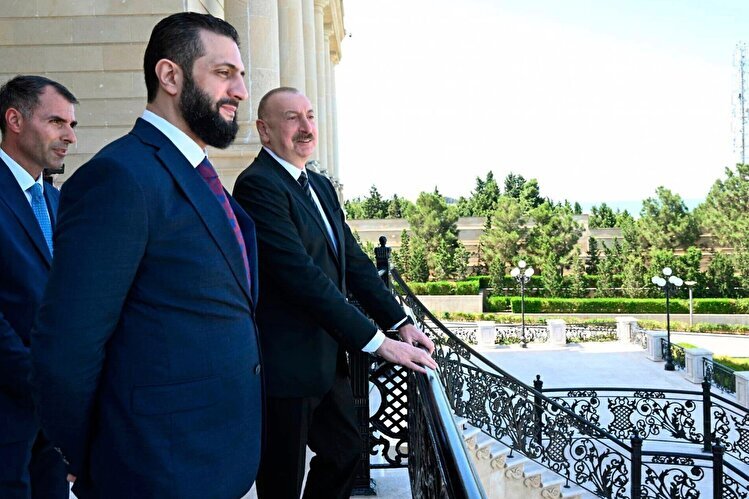Unsaid Facts from Jolani's Visit to Baku
TEHRAN (Defapress) - The recent meetings between the officials of Syria and Azerbaijan in Baku highlight profound and rapid shifts in the geopolitical landscape of the Middle East and the Caucasus. These developments, accelerated by the fall of Bashar al-Assad's regime and the direct conflict between Iran and Israel, have intensified the complexity of the security crisis in West Asia.

The West Asia and Caucasus regions are currently witnessing deep and rapid geopolitical transformations. These changes are largely influenced by two major recent events: the unexpected collapse of Bashar al-Assad's government in Syria and the 12-day imposed war between the Zionist regime and Iran.
On the other hand, Syria's new government, under the leadership of the Jolani regime, is pursuing a more pragmatic foreign policy. The recent convergence of interests among previously hostile actors, particularly the emerging diplomatic and security interactions involving Syria's new leadership, Azerbaijan, and Israel, signals a significant and potentially durable realignment. This convergence directly impacts Iran's strategic environment, creating new challenges for Iran’s security and regional standing.
Recent developments in the region, particularly after the fall of Bashar al-Assad and the 12-day war imposed by Israel against Iran, indicate an accelerated regional rearrangement with profound implications for Iran. The collapse of the Assad regime in December 2024 and the June 2025 war between Israel and Iran are not only historical turning points but also powerful catalysts for a swift and deep restructuring of regional power dynamics.
In this context, Azerbaijan's prominent role as the host and mediator for crucial meetings between Jolani and Ilham Aliyev, the President of Azerbaijan, as well as representatives of the Zionist regime, demonstrates the willingness of regional and international actors to explore and establish new diplomatic pathways that transcend traditional hostilities. This suggests that the current geopolitical shifts are not gradual but rather an accelerated process of regional realignment driven by these two major power shifts.
Importantly, meetings between Syrian and Israeli officials have taken place in Baku on the sidelines of Jolani's visit. According to reports, these discussions focused on "Israel's recent military presence in Syria." The Jolani regime has also confirmed having indirect contacts with Israel regarding a return to the 1974 Separation of Forces Agreement. The potential agreement has been described not as full normalization but as a security arrangement primarily aimed at "preventing Iranian influence, distancing Resistance Forces, and maintaining their desired calm along the border."
Accordingly, it must be said that this meeting agenda directly reflects a strategic objective to counter Iran's influence in Syria. The United States is also actively involved, with reports indicating that a meeting at the White House is planned for September, where Jolani, Syria's president, and Benjamin Netanyahu, Israel's prime minister, are expected to sign a security agreement.
However, the critical and sensitive issue here is that Azerbaijan's role as the host for direct meetings between Syrian officials and the Zionist regime is by no means coincidental; rather, it is deeply strategic. Today, Azerbaijan is recognized as a "close ally of both Israel and Syria" and is also an active mediator between Turkey and the Zionist regime regarding Syrian affairs.
On the other hand, choosing Baku as the venue for these meetings, rather than a more traditional diplomatic hub, underscores Azerbaijan's growing influence and its willingness to engage in sensitive and high-stakes regional diplomacy. This positions Azerbaijan as a key geopolitical focal point in the region.
Another critical point is Azerbaijan's emergence as an important and active geopolitical player capable of fundamentally reshaping regional alliances and potentially isolating Iran at the regional level. But how is Azerbaijan achieving this?
The answer lies in the fact that by facilitating direct engagement between the Zionist regime and the Jolani regime, Baku effectively diminishes Iran's ability to exert influence through popular networks and ideological solidarity, thereby challenging Iran's regional strategic calculations.
In this context, it is necessary to examine the bilateral relations between Azerbaijan and the Zionist regime. The relationship between the two is multifaceted and robust, encompassing vital sectors such as defense, intelligence, trade, and energy. Moreover, Azerbaijan serves as a major oil supplier to the Zionist regime, reportedly providing over 60% of its gasoline in 2019.
In return, the Zionist regime is Azerbaijan's primary arms supplier, accounting for about 69% of Azerbaijan's total arms imports between 2010 and 2019 and ranking as the second-largest buyer of the regime's defense products between 2018 and 2022. Additionally, weapons produced by this regime were decisive in the 2020 Karabakh war.
Another important aspect of the relationship between Azerbaijan and the Zionist regime is their intelligence cooperation, which forms the backbone of their ties. Reports indicate that Mossad has maintained electronic surveillance posts in Azerbaijan since the 1990s to monitor Iran.
Finally, the political and military officials of the Islamic Republic of Iran must, considering the history and actions of the countries that met in Baku, and taking into account the Zionist regime's operations and attacks on western Iran in recent weeks, as well as the high level of the Zionist regime's influence in Azerbaijan and the behind-the-scenes relations between the Jolani regime and Tel Aviv, maintain vigilance and take appropriate measures to first identify and then neutralize the threats that may arise from them against Iranian territory.
